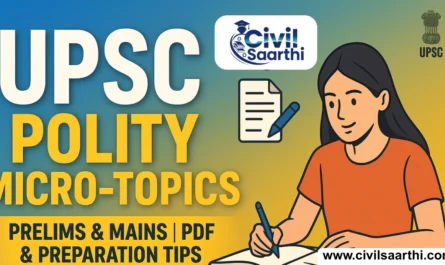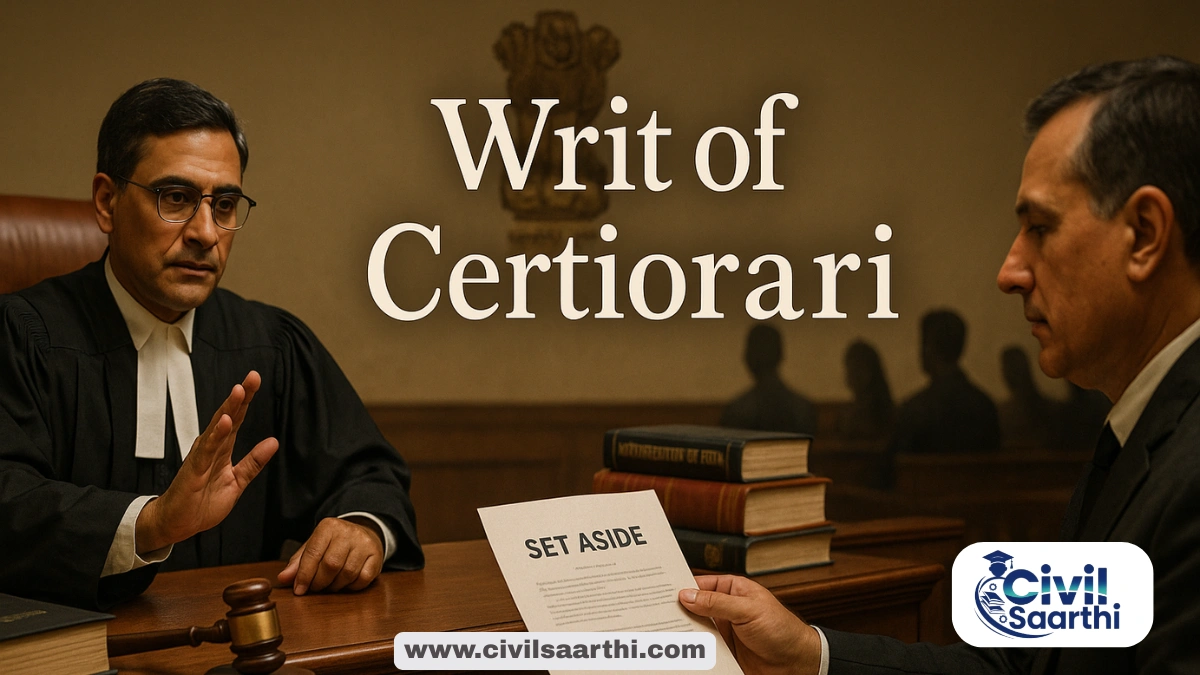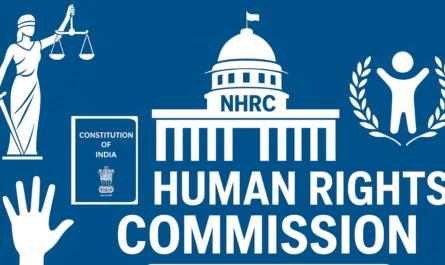The topic Fundamental Duties and its Amendments is one of the most essential components of the Indian Constitution that every UPSC aspirant must master. Introduced by the 42nd Constitutional Amendment Act, Fundamental Duties provide the moral obligations that every citizen is expected to follow. Understanding Fundamental Duties and its Amendments is crucial for answering questions in both UPSC Prelims and Mains, as well as in Ethics (GS Paper IV).
Fundamental Duties Introduction
Understanding Fundamental Duties is essential for every UPSC aspirant as it reflects the moral obligations of citizens in a democracy. These duties were added to the Constitution to instill a sense of responsibility and patriotism among citizens. The concept draws inspiration from socialist constitutions like that of the USSR and emphasizes harmony and national integration.
Fundamental Duties Overview
The concept of Fundamental Duties was borrowed from the USSR, highlighting the responsibility of citizens in strengthening the constitutional spirit of India. Initially, the Constitution did not include these duties, but they were later inserted to ensure civic responsibility among citizens. The total number of Fundamental Duties is 11 after the 86th Amendment Act of 2002. The overview below outlines key aspects of Fundamental Duties and its Amendments.
Fundamental Duties and its Amendments – Overview | |
| Feature | Description |
| Origin | 42nd Constitutional Amendment Act, 1976 |
| Borrowed From | USSR Constitution |
| Number of Duties Initially | 10 |
| Added by | Sardar Swaran Singh Committee (1976) |
| Total Duties at Present | 11 |
| Latest Amendment | 86th Amendment Act, 2002 (added duty related to education) |
List of 11 Fundamental Duties of India
The Fundamental Duties and its Amendments currently include eleven specific responsibilities. These duties guide citizens to respect the Constitution, promote harmony, protect the environment, and more.To abide by the Constitution and respect its ideals and institutions.
- To abide by the Constitution and respect its ideals and institutions.
- To cherish the noble ideals of the freedom struggle.
- To uphold and protect the sovereignty, unity, and integrity of India.
- To defend the country and render national service when called upon.
- To promote harmony and the spirit of common brotherhood among all the people of India.
- To value and preserve the rich heritage of India’s composite culture.
- To protect and improve the natural environment including forests, lakes, rivers, and wildlife.
- To develop scientific temper, humanism, and the spirit of inquiry and reform.
- To safeguard public property and to abjure violence.
- To strive towards excellence in all spheres of individual and collective activity.
- To provide opportunities for education to children between the age of 6–14 years (added by 86th Constitutional Amendment Act, 2002).
Fundamental Duties Features
The Fundamental Duties and its Amendments carry unique features that define their significance. Though not justiciable, they are considered moral and civic responsibilities that every citizen should fulfill.
Fundamental Duties Features | |
| Feature | Description |
| Not enforceable | Cannot be legally enforced by courts unless backed by legislation |
| Moral and civic obligations | Acts as guidelines for responsible citizenship |
| Covers individuals only | Applicable only to citizens, not foreigners or entities |
| Inspired by USSR Constitution | Drawn from international socialist models |
| Basis for laws | Parliament can make laws to enforce duties |
Fundamental Duties Importance
The Fundamental Duties and its Amendments are crucial for maintaining constitutional order and national unity. They act as a reminder that rights must be balanced with duties for democracy to thrive.
Fundamental Duties Importance | |
| Importance | Explanation |
| Promotes responsible citizenship | Encourages individuals to act in national interest |
| Strengthens national unity | Emphasizes integrity, unity, and patriotism |
| Enhances value system | Builds a culture of tolerance and harmony |
| Serves as legal aid | Can be referenced in court for interpreting the Constitution |
| Encourages public participation | Inspires active and positive involvement in nation-building activities |
Relation between Fundamental Rights and Fundamental Duties
In the context of Fundamental Duties and its Amendments, there is a strong interrelationship with Fundamental Rights. While rights empower citizens, duties regulate their conduct for the collective good.
Relation between Fundamental Rights and Fundamental Duties | ||
| Comparison | Fundamental Rights | Fundamental Duties |
| Nature | Justiciable | Non-justiciable |
| Objective | Protect individual liberty | Promote responsibility |
| Enforcement | Enforced through courts | Not enforceable unless made into laws |
| Applicability | Available to citizens and some to non-citizens | Applicable only to citizens |
| Source | Derived from Western liberal tradition | Derived from Socialist principles |
Important Supreme Court Judgements on Fundamental Duties
The judiciary has interpreted Fundamental Duties and its Amendments in various rulings to uphold their relevance. While not enforceable by themselves, courts have used them to support constitutional values.
Important Supreme Court Judgements on Fundamental Duties | ||
| Case Name | Year | Key Ruling on Fundamental Duties and its Amendments |
| AIIMS Students’ Union Case | 2001 | Emphasized harmony between Fundamental Rights and Duties |
| Ranganath Mishra Case | 2003 | Duties can be enforced if supported by legislation |
| MC Mehta vs Union of India | 1988 | Environment protection interpreted through Fundamental Duties |
| Aruna Roy Case | 2002 | Education duty connected to secularism and constitutional values |
| Indira Gandhi v Raj Narain | 1975 | Advocated moral discipline through duties during Emergency |
Laws Enforcing Fundamental Duties
Though duties are non-enforceable by themselves, several laws have been enacted to implement them. For example, the Prevention of Insults to National Honour Act enforces respect for the national flag and anthem, while the RTE Act upholds the duty to educate children aged 6-14 years.
Laws Enforcing Fundamental Duties | |
| Duty Enforced | Corresponding Law |
| Respect for Flag and Anthem | Prevention of Insults to National Honour Act, 1971 |
| Environmental Protection | Environment Protection Act, 1986 |
| Free and Compulsory Education | Right to Education Act, 2009 |
| Protection of Public Property | Prevention of Damage to Public Property Act, 1984 |
Justice Verma Committee on Fundamental Duties
The Justice Verma Committee provided detailed recommendations on how Fundamental Duties and its Amendments can be made more effective. It emphasized the need for awareness and suggested legal mechanisms for their enforcement.
Justice Verma Committee on Fundamental Duties | |
| Recommendation Area | Suggestions Made by Justice Verma Committee |
| Educational reforms | Inclusion of Fundamental Duties in curriculum |
| Legal framework | Enabling laws for better implementation |
| Public awareness | Mass campaigns and inclusion in civil service training |
| Civil services role | Officers to uphold duties in public administration |
| Judiciary role | Interpret duties in harmony with rights and Directive Principles |
Issues and Challenges in Implementation
Despite their constitutional significance, Fundamental Duties face numerous implementation challenges due to their non-justiciable nature and lack of public awareness. These issues hinder their role in fostering responsible citizenship and constitutional morality.
- Low Awareness: Most citizens are unaware of their Fundamental Duties due to lack of public education and outreach.
- Non-Justiciable: Duties are not legally enforceable unless supported by specific legislation.
- Limited Legal Backing: Only a few duties like education and environment have corresponding laws.
- Neglect in Governance: Policymakers and institutions rarely integrate duties into law-making or administration.
- Weak Civic Education: Schools and colleges do not emphasize constitutional duties adequately.
- Risk of Misuse: Duties are sometimes invoked selectively for political or ideological purposes.
- Overlap with Directive Principles: Confusion arises due to similarity with non-enforceable Directive Principles.
- No Periodic Review: Duties haven’t been updated to address modern issues like digital ethics.
- Limited Judicial Push: Courts have used duties interpretively but haven’t advocated wider enforcement.
- Low Public Engagement: Duties are rarely discussed in public forums, media, or social campaigns.
Way Forward for Effective Implementation of Fundamental Duties
- Enhance Public Awareness: Launch targeted awareness campaigns through media, community programs, and digital platforms to educate citizens about their duties.
- Integrate into Education: Include Fundamental Duties in school and college curricula to instill civic responsibility from a young age.
- Strengthen Legal Framework: Enact supporting laws for key duties like harmony, scientific temper, and protection of heritage to ensure accountability.
- Periodic Constitutional Review: Review and update Fundamental Duties periodically to address new-age issues like cyber ethics, AI, and climate responsibility.
- Promote Civic Participation: Encourage citizen-led initiatives and NGOs to promote duty-conscious behavior at the grassroots level.
- Judicial Interpretation: Courts should continue to interpret duties in line with constitutional values and guide policy through landmark judgments.
- Civil Services Training: Train public servants to uphold Fundamental Duties in governance and service delivery.
- Incentivize Compliance: Recognize and reward individuals or institutions actively promoting constitutional duties in public life.
- Strengthen Institutional Role: Institutions like NCERT, Election Commission, and UGC can play a pivotal role in spreading awareness and enforcing civic duties.
- Balanced Application: Ensure that promotion of duties doesn’t infringe upon Fundamental Rights or become a tool for moral policing.
UPSC Polity Prelims PYQs on Fundamental Duties
Consider the following pairs: [2025]
| Provision in the Constitution of India | Stated under |
| I. Separation of Judiciary from the Executive in the public services of the State | The Directive Principles of State Policy |
| II. Valuing and preserving the rich heritage of our composite culture | The Fundamental Duties |
| III. Prohibition of employment of children below the age of 14 years in factories | The Fundamental Rights |
How many of the above pairs are correctly matched?
(a) Only one
(b) Only two
(c) All the three
(d) None
Answer: (c) All the three
Which of the following statements is/are true of the Fundamental Duties of an Indian citizen? [2017]
- A legislative process has been provided to enforce these duties
- They are correlative to legal duties
Select the correct answer using the code given below:
- a) 1 only
- b) 2 only
- c) Both 1 and 2
- d) Neither 1 nor 2
Ans d
In the context of India, which one of the following is the correct relationship between Rights and Duties? [2017]
- a) Rights are correlative with Duties
- b) Rights are personal and hence independent of society and Duties
- c) Rights, not Duties, are important for the advancement of the personality of the citizen
- d) Duties, not Rights, are important for the stability of the State
Ans a
“To uphold and protect the Sovereignty Unity and Integrity of India” is a provision made in the: [2015]
- a) Preamble of the Constitution
- b) Directive Principles of State Policy
- c) Fundamental Rights
- d) Fundamental Duties
Ans d
Which of the following is/are among the Fundamental Duties, laid down in the Indian Constitution? [2012]
- To preserve the rich heritage of our composite culture
- To protect the weaker sections from social injustice
- To develop the scientific temper and spirit of inquiry
- To strive towards excellence in all spheres of individual and collective activity
Select the correct answer, using the codes below:
- a) 1 and 2 Only b) 2 Only
- c) 1, 3, and 4 Only d) 1, 2, 3 and 4
Ans c
Under the constitution of India, which one of following not a fundamental duty?
[2011]
(a) To vote in public elections
(b) To develop the scientific temper
(c) To safeguard public property
(d) To abide by the Constitution and respect its ideals
Ans a
Fundamental Duties FAQs
What are Fundamental Duties and its Amendments?
Fundamental Duties and its Amendments are constitutional guidelines for citizens to promote patriotism and civic sense, introduced by the 42nd Amendment in 1976.
How many Fundamental Duties are there in the Constitution?
There are a total of 11 Fundamental Duties in Article 51A under Part IV-A of the Constitution.
Are Fundamental Duties legally enforceable?
No, Fundamental Duties are not justiciable unless supported by specific legislation.
Which committee recommended the inclusion of Fundamental Duties?
The Swaran Singh Committee recommended the inclusion of Fundamental Duties in the Constitution.
What is the significance of the 86th Constitutional Amendment?
The 86th Amendment added the 11th Fundamental Duty, which makes it a duty for parents/guardians to provide education to children aged 6-14 years.







